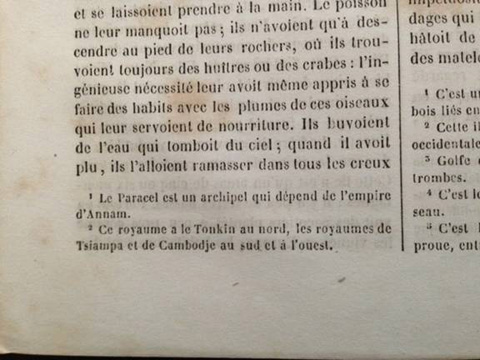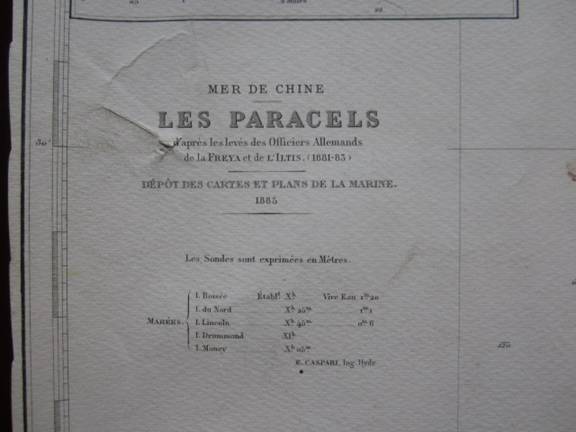

Old document proves Vietnam's sovereignty over the Paracel and Spratly Islands.
In recent years, countries in the region such as the Philippines, Malaysia, Indonesia and Vietnam have seen important changes related to the disputes in the East Sea (South China Sea).
With the Philippines, after conducting peaceful dialogue to resolve the dispute, as China’s stance did not change, at the end of January 2013, the Philippines took its case against China to the International Tribunal for the Law of the Sea under Annex VII of the United Nations Convention on the Law of the Sea (UNCLOS).
In late February, Francis Jardeleza, the lawyer in charge of the lawsuit of the Filipino Government, urged Vietnam and Malaysia to participate in the lawsuit. One month after the call, the Philippines submitted legal files of nearly 4,000 pages to the International Tribunal in accordance with the process.
In Malaysia, in March 2013, Chinese warships appeared for the first time in James Shoals, deep into the exclusive economic zone (EEZ) of Malaysia, just 43 nautical miles from the Sarawak coast. This is the southernmost point in the "cow tongue" of China.
For approximately six months later, Malaysia implemented a plan to establish a new naval base in the largest town of Sarawak to deal with China's threats.
Since the early 1990s, Indonesia has not had a marine dispute with China. Indonesia holds a neutral position and plays an intermediary role in reconciliation between the parties. After the signing of the "Declaration on the Conduct of the Parties in the East Sea" (DOC) in 2002, for nearly a decade, Indonesia and other ASEAN countries drafted the "Code of Conduct on the East Sea" (COC) which is more binding than the DOC. This effort did not receive a positive response from China.
In mid-April 2014, Indonesia changed its neutral position when it announced it would to strengthen military forces in the Natuna Islands as the "cow tongue" of China covers Indonesia's territorial waters.
On the Vietnam side, from the early 2000s, China blatantly announced an annual fishing ban on the waters of Vietnam. Moreover, China constantly caused damage to property and lives of Vietnamese fishermen.
At the beginning of October 2011, in the presence of the two party leaders, China and Vietnam signed an agreement to resolve maritime issues "through negotiations and friendly consultations". [5]
At the end of November 2011, the Vietnamese government for the first time mentioned the event in which China used force to conquer the entire Paracel Islands in 1974.
Prior to the escalation of aggression, provocation and serious violations of international laws of China, in late April 2013, Vietnam's leaders also for the first time mentioned international law as a tool to resolve disputes with China.
In early May 2014, when it blatantly deployed its oil rig deep into in Vietnam's EEZ, seriously violating the sovereignty of Vietnam, China officially showed Vietnam and the international community that China’s commitments to Vietnam, including an agreement signed in 2011 on resolve marine disputes in the East Sea by "peaceful dialogue", absolutely has no value.
For the past nearly 40 years, Vietnam has constantly urged China to resolve disputes over Hoang Sa and Truong Sa (Paracel-Spratly) Islands by peaceful dialogue.
According to a Chinese scholar Hanling Wang, China's view is: "There is nothing to negotiate. China's sovereignty over the Paracel Islands has never been the subject of dispute and Vietnam acknowledged this in the past. Discussing collaborative efforts to protect natural resources, search and rescue and other things is one thing, China's sovereignty is a different thing."
China's stance on the Paracel Islands is clear: the Paracel belongs to China. They also falsely suggested that Vietnam "set aside dispute and pursue joint development" on the Spratly Islands, in the waters of Vietnam.
With over 3.5 million km2, the East Sea is a part of the Pacific Ocean, covering the territorial waters of Vietnam, China, Taiwan, the Philippines, Malaysia, Brunei, Indonesia, and Singapore.
In the era of economic globalization, the East Sea is not only important for these regional countries but also for many other countries in the world.

Old document proves Vietnam's sovereignty over the Paracel and Spratly Islands.
Every year more than $5.3 trillion of international trade passes through the East Sea, including $1.2 trillion from the US.
Due to the strategic positions of the Paracel and Spratly Islands, they play a key role in China’s "cow tongue" in the East Sea.
When using international law to resolve the East Sea dispute with China, Vietnam not only solves the problem of territorial sovereignty between the two countries, but also can help bring security and stability for all countries, depending on maritime traffic through the East Sea.
It also shows the world that Vietnam is a country that respects law and is accountable to the international community.
To create a breakthrough in the deadlock and to take advantage of the current advantages, considered from the perspective of international law, historical evidence and the regional situation as mentioned in the article, Vietnam should publicly urge China to agree to resolve the East Sea disputes at international courts.
China has its representative judges in the International Tribunal for the Law of the Sea and the International Court of Justice; China has always insisted to the world that they had sufficient historical and legal evidence supporting the "cow tongue" claim in general and the Paracel and Spratly Islands in particular.
If China wants to prove that they are also a law-abiding country and responsible to the international community, if China's assertion of sovereignty is based on truth, there is hardly any other plausible reasons for China to deny the role of settling disputes between countries that the International Court has performed effectively in the past 60 years.
Vietnam is facing a major responsibility entrusted by history. It is to use international law to maintain peace in a vital area of the world.